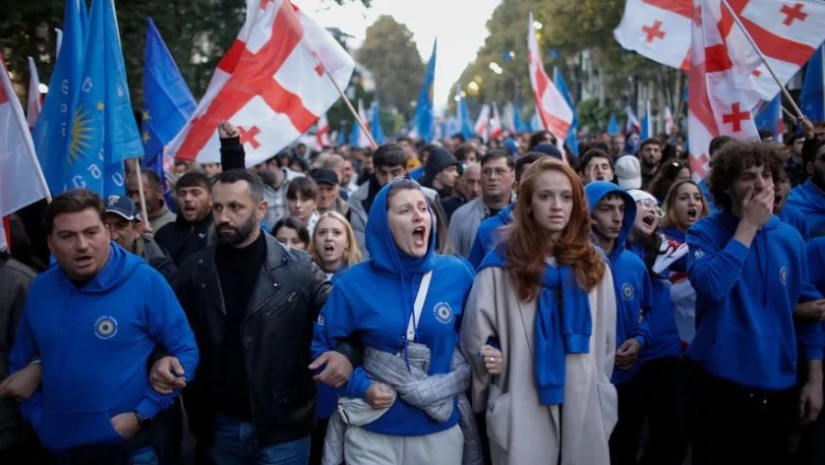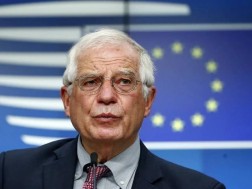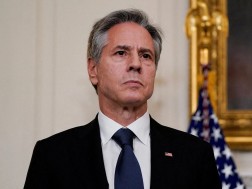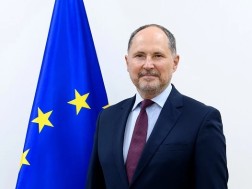Voters in Georgia, a small country nestled at the intersection of Europe and Asia, are heading to the polls on Saturday in a parliamentary election that has been described as the most pivotal since the country gained independence from the Soviet Union in 1991 and will decide whether Georgia shifts away from its long-held Western alignment toward stronger economic and political ties with the Kremlin.
What is at stake?
Voters will decide whether the Georgian Dream party, which has controlled Parliament and the government since 2012, secures another four-year term.
Georgian Dream, under the guiding hand of its honorary party chair, Moscow-friendly billionaire oligarch Bidzina Ivanishvili, is portraying itself as a “party of peace,” strongly implying that if the opposition gains control, it would pull Georgia into a war with Russia.
The opposition and liberal part of Georgian society present the vote as part of the country’s long-running tug-of-war between aligning with the West and sliding back into Moscow’s orbit — a choice between democracy and a form of authoritarianism.
“It is existential in a sense that we are choosing now. We are not just voting for a party; we are voting to see if we will have a well-functioning democracy in Georgia, or at least the perspective of building one,” said Nino Samkharadze, a policy analyst at the Georgian Institute of Politics.
How does the election work?
The election is held under a new proportional electoral system in which parties have to reach a 5 percent threshold to take seats in Parliament.
Seats in the 150-member Parliament will be divided among qualifying parties based on the proportion of the vote they receive. Georgian Dream has set an ambitious goal of achieving a supermajority of 113 seats, which would bring its goal of establishing a one-party state closer.
The ruling party’s bid is contested by four main opposition parties, which have all endorsed the Georgian Charter, an initiative proposed by pro-Western President Salome Zourabichvili, urging them to prevent Georgian Dream from forming a coalition and remaining in power.
Under the charter, should the opposition win, Zourabichvili would form a government of technocrats that would restore fraying ties with the West and repeal the most authoritarian laws that Georgian Dream has passed in the run-up to the campaign.
The outcome of the election remains open as polling data in Georgia is considered unreliable. Recent surveys indicate that Georgian Dream could get the most votes but that if the four main opposition parties form a coalition, they would have a majority. Many expect street unrest similar to the protests against the party’s policies earlier this year.
What about Georgia’s bid to join the E.U.?
The goal of joining the European Union has for years been enshrined in Georgia’s constitution, and polls consistently show that around 80 percent of the population supports E.U. accession. But the anti-West pivot and democratic backsliding caused by controversial laws pushed by Georgian Dream in the run-up prompted the organization to freeze the process.
In an ironic twist, it was the very same Georgian Dream party that paved the way for the country to eventually gain candidate status in late 2023. But over the course of its third term, the party made a U-turn and hardened its stance on rapprochement with the West.
Samkharadze said the policy turnaround is also a quest for power against the backdrop of decreasing support for the party. This is in part driven by a failure to respond to the public’s economic demands and pressure to instill a fully proportional election system, which weakened Georgian Dream’s unilateral grip on power.
Georgian Dream maintains that E.U. membership is still a goal for 2030, with the slogan “Yes to the E.U. — but with dignity!” The opposition has repeatedly accused the party of subverting this objective.
What laws did Georgian Dream pass?
The so-called “foreign agent law” passed earlier this year requires nongovernmental groups and independent media outlets to register as “agents of foreign influence.” The bill, which sparked mass protests across Georgia, is in many ways a copy of a Russian law that has been used to crush political dissent.
Russia has moved along a similar track in recent years, steadily dismantling civil society, with President Vladimir Putin making conservative values a cornerstone of his national idea and his struggle against Western influence.
In September, the Georgian Parliament passed a law banning “LGBT propaganda,” decried by rights activists as discriminatory and similar to another Russian law that has been used to target vulnerable groups.
Ivanishvili stated that “the Western propaganda” about sexual minorities endangers Georgian society.
“The global war party is a very powerful force with many resources. It confronts the world with LGBTQ propaganda and influences many bureaucrats in developing countries,” he said in a recent TV interview.
What is Russia’s role in this?
Georgia has long been a target of Russia’s hybrid approach, a mix of soft power, disinformation and propaganda with military threats and trade embargoes, experts say.
The threat of the war in Ukraine spilling into other post-Soviet states looms large, and parts of Georgia are still occupied following Russia’s 2008 invasion, in the name of backing the separatist regions of South Ossetia and Abkhazia.
Russia’s full-scale invasion of Ukraine has accelerated Georgian Dream’s attempts to derail Georgia’s Euro-Atlantic trajectory. As part of its pre-election campaign, the party put up banners where one side featured destroyed Ukrainian cities, with the caption “No to war!” and crossed-out election numbers of opposition parties. The other side of the banner juxtaposed intact Georgian buildings with the tagline “Choose peace.”
Ivanishvili, who made his fortune in Russia in the 1990s, has also echoed many of Putin’s talking points, appealing to Georgia’s Christian-conservative part of society, capitalizing on ideological and generational divides between liberal-oriented youth and an older generation beholden to the Soviet era, said Vladimir Liparteliani, a scholar at Britain’s Durham University.
The Kremlin on Friday dismissed all allegations of attempting to influence elections in Georgia and Moldova, where people voted in favor of pro-EU constitutional changes by a tiny margin after officials accused Russia of staging a large-scale campaign to swing the referendum in Moscow’s favor.
“We are in no way trying and are hardly in a position to influence electoral processes in these countries,” Kremlin spokesman Dmitry Peskov said. “We do not influence or interfere in Georgian affairs in any way. … But we see absolutely unprecedented attempts of interference from the West.”
“There they are not only trying to twist Tbilisi’s arms, but they are actually trying to dictate terms,” Peskov added. “It is hard to imagine how the proud Georgian people can tolerate such ultimatums, which are hurled at them daily.”
Source: Washingtonpost.com
















